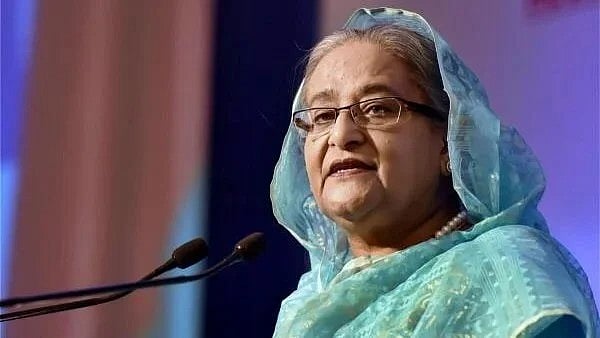
Ousted Bangladesh Prime Minister Sheikh Hasina.
Credit: PTI Photo
The International Crimes Tribunal (ICT)’s death sentence against former Bangladesh Prime Minister Sheikh Hasina marks a deeply unsettling moment in the country’s political trajectory. A former head of government has been convicted of crimes against humanity. This verdict comes at a time of extraordinary polarisation, well over a year after the student-led uprising that toppled Hasina’s fifteen-year rule, forced her into exile, and installed an unelected interim administration led by Nobel laureate Muhammad Yunus. Instead of stabilising the country, the decision risks intensifying political turbulence, emboldening extremist forces, and plunging Bangladesh further into uncertainty.
To many observers, the case that has been framed as a pursuit of justice appears inseparable from long-standing political vendettas. The tribunal – revived by Hasina in 2010 primarily to prosecute Jamaat-e-Islami leaders for atrocities committed during the 1971 Liberation War – is being used to try Hasina herself. This reversal has raised fundamental questions about motive and credibility. For over a decade, Jamaat’s leadership was politically marginalised and subjected to sustained legal pressure under successive Awami League governments. Yet in the political reconfigurations that followed Hasina’s fall, Jamaat has resurfaced and is widely perceived to have found common ground with the Yunus administration. That the same tribunal which once sentenced Jamaat leaders is now delivering a death sentence to the very leader who revived it reinforces the perception of political retribution.
Any assessment of the verdict must also account for the fraught relationship between Yunus and Hasina. Their rivalry, rooted in clashing worldviews, personal mistrust, and past confrontations, has shaped Bangladesh’s political discourse for nearly two decades. When Yunus signalled political ambitions in 2007, Hasina interpreted it as a direct challenge. Subsequent government actions targeting Yunus and microfinance bodies deepened the animosity. After Hasina fled to India in August 2024, Yunus returned to Dhaka and assumed leadership of the interim government. The new administration swiftly banned the Awami League, arrested its senior leaders, and revived multiple cases against Hasina. Within this context, the tribunal proceedings cannot be viewed merely as judicial acts; they are deeply enmeshed in the political calculations of an interim regime led by Hasina’s principal adversary.
The conduct of the trial has raised further concerns. Hasina and her former home minister were tried in absentia, a procedure permissible in Bangladeshi law but contentious in politically charged cases. Much of the prosecution’s case relies on testimony from former police chief Chowdhury Abdullah Al-Mamun, who turned state witness after he himself faced charges. Debate persists over whether his testimony was voluntary or coerced. Rights groups have argued that the evidentiary threshold required for a sentence of this severity has not been met.
Predictably, the verdict has not calmed tensions. The Awami League’s nationwide shutdown has impacted urban centres, and clashes have been reported. Groups aligned with the BNP and various Islamist organisations have mobilised in support of the verdict, while others have threatened violence should Hasina attempt to return. Attacks on symbols associated with the Awami League underscore the escalating volatility. Minority communities – particularly Hindus – have faced increased assaults since the fall of the Awami League, reflecting a dangerous rise in majoritarian mobilisation. Despite deployments of the armed forces, the unrest shows no sign of abating.
Deepening chaos
The political environment has become more precarious because the interim government has banned the Awami League from political activity, effectively disenfranchising millions. Any election held without one of South Asia’s largest political parties risks lacking legitimacy from the outset. The Yunus administration’s plan to hold a general election and a referendum on sweeping constitutional reforms in February 2026 has deepened suspicion that the process is being engineered to prolong the interim regime’s tenure under the guise of reform.
The regional implications are equally significant. With India sheltering Hasina, there is an added diplomatic undercurrent. The interim government’s shift in foreign policy marks a sharp departure from Hasina’s decade-long emphasis on maintaining stable relations with India. Accelerated engagement with China – including interest in acquiring advanced military platforms – alongside renewed warmth with Pakistan has unsettled New Delhi.
Seen against this backdrop, the sentence appears less a quest for justice than a catalyst for further instability. It threatens to deepen divisions and open space for extremist forces. The verdict has intensified an already volatile environment, raising questions about the future of Bangladesh’s democracy and the direction in which the interim administration intends to steer the country. The judgement has been delivered, but the reckoning for Bangladesh’s political future has only begun.
(The writer is an associate fellow at the Manohar Parrikar Institute for Defence Studies and Analyses)
Disclaimer: The views expressed above are the author's own. They do not necessarily reflect the views of DH.